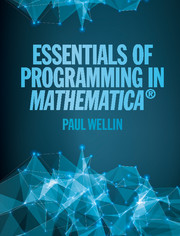Summary
Functional programming – the use and evaluation of functions as a programming paradigm – has a long and productive history in the world of programming languages. Lisp came about in the 1950s in the search for a convenient language to represent mathematical concepts in programs, borrowing from the lambda calculus of the logician Alonzo Church. More recent languages have in turn embraced many aspects of Lisp – in addition to Lisp's offspring such as Scheme and haskell, you will find elements of functional constructs in Java, Python, Ruby, and Perl. Mathematicaitself has clear bloodlines to Lisp, including the ability to operate on data structures such as lists as single objects and in its representation of mathematical properties through rules.
Mathematica functions, unlike those in many other languages, are considered “first-class” objects, meaning that they can be used as arguments to other functions, they can be returned as values, and they can be part of many other kinds of data objects such as arrays. In addition, you can create and use functions at runtime, that is, when you evaluate an expression. This functionalstyle of programming distinguishes Mathematicafrom traditional procedural languages like C and Fortran. Facility with functional programming is therefore essential for taking full advantage of the Mathematica language to solve your computational tasks.
We start with some of the most useful functional programming constructs – higher-order functions such as Map, Apply, Thread, Select, and Outer. We then introduce iteration, a mechanism by which the output of one computation is fed as input into the next.
- Type
- Chapter
- Information
- Essentials of Programming in Mathematica® , pp. 133 - 208Publisher: Cambridge University PressPrint publication year: 2015

